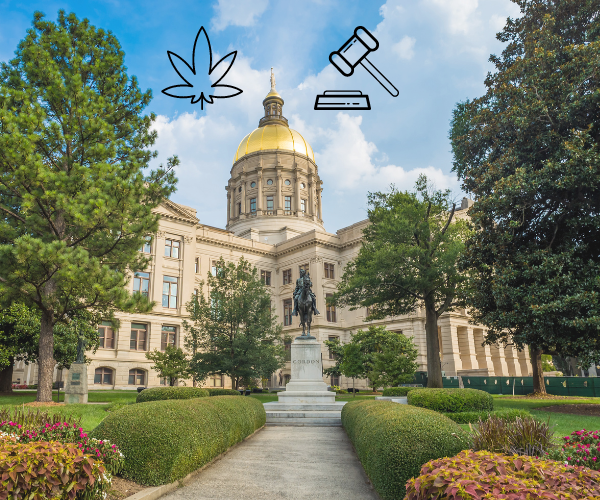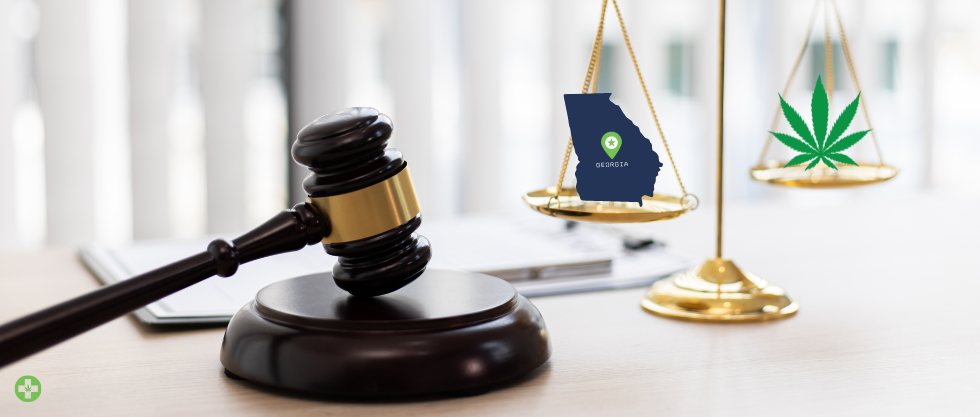The nationwide conversation surrounding cannabis legalization continues to gain momentum. As a result, many look towards services like MJCard for help in obtaining a medical cannabis card.
In the current legal framework, cannabis remains illegal in Georgia. That’s for both medical and recreational use. Aligned with federal laws, the plant is enforced under Georgia’s Controlled Substances Act. And penalties for possession without a medical card are notably stringent.
Fortunately, exceptions have also been established. For example, we’ll look at the provision for low-THC oil under the Haleigh’s Hope Act of 2015 in this blog.
Understanding cannabis laws in Georgia is paramount to accessing safe and legal medicine. This is also where MJCard steps in as a valuable resource. We specialize in qualifying and approving patients for medical cannabis cards.
In this guide, we’ll explore Georgia’s current cannabis laws. We’ll also look at what’s on the table for Georgia in 2024. Let’s shed light on restrictions, exceptions, and the alternative medical solutions available. We’ll even take a closer dive into proposed bills and resolutions from the most recent legislative session. Keep reading to observe insights into the present and potential future of cannabis regulation in Georgia.
Cannabis Laws in Georgia
In Georgia, the cannabis legal landscape sees stringent regulations. The state positions the plant under the Georgia Controlled Substances Act. That categorization places severe restrictions on its possession, use, and cultivation.
Still, there are many cannabis consumers in Georgia. At MJCard, we believe everyone deserves the right to access cannabis as a medicine. To do that, one must understand Georgia’s cannabis laws.
Penalties for Possession
Possession of marijuana in Georgia carries substantial legal consequences. If found in possession, they may face penalties ranging from misdemeanor charges to felony charges. The severity of penalties highlights Georgia’s commitment to maintaining strict control over cannabis.
Exception for Low-THC Oil
Fortunately, even the strict state of Georgia has exceptions. The most notable exception for medical cannabis is in the form of low-THC oil — but it’s a start. Enacted in 2015, the Haleigh’s Hope Act opened a narrow avenue for cannabis patients.
Haleigh’s Hope Act (2015)
The Haleigh’s Hope Act stands as a milestone in Georgia’s cannabis legislation. It aims to provide relief to individuals suffering from specific medical conditions. The act allows for the possession and use of low-THC oil derived from cannabis — not just hemp.
Conditions Eligible for Low-THC Oil Treatment
The Act outlines a specific set of medical conditions for low-THC oil treatment. These conditions include but are not limited to:
- Cancer
- AIDS
- HIV
- Crohn’s disease
- Tourette’s syndrome
- Seizure disorders
- Alzheimer’s disease
- Post-traumatic stress disorder
- Intractable pain
The targeted approach ensures low-THC oil is accessible to whoever may benefit most.
Limitations and Restrictions of the Act
While the Haleigh’s Hope Act represents progress, its scope is notably limited. For the time being, patients still can’t cultivate cannabis at home for medical needs. The act also explicitly prohibits the ingestion of low-THC oil in several popular forms. These include edibles, smoking, vaping, and more.
The state strictly prohibits possession of the plant in any leaf form. Qualifying patients must obtain a certification from physicians to be eligible for the low-THC oil at all. Fortunately, one can get a doctor’s certification through services like MJCard.
 Cannabis Use in Georgia
Cannabis Use in Georgia
Recreational use remains strictly illegal, and Georgia works to enforce those laws. Presently, possessing more than one ounce of cannabis is a felony. It carries a mandatory minimum of 12 months imprisonment and up to 10 years of incarceration. Possessing up to one ounce attracts misdemeanor charges. Penalties may include imprisonment for up toa year and a fine of up to $1,000.
Decriminalization in Certain Cities
Despite overarching state regulations, some cities within Georgia have taken steps to decriminalize. These cities have at least decriminalized small amounts of cannabis, even for recreational use:
- Atlanta
- Athens
- Forest Park
- Clarkston
- South Fulton
- Statesboro
- Stonecrest
- Savannah
These cities each implement local ordinances to reduce penalties for possession of up to one ounce. The localized approach adds an extra layer of complexity to Georgia’s cannabis laws.
Registered Low-THC Oil Patients
Thanks to Haleigh’s Hope Act, services like MJCard can help consumers become registered low-THC oil patients. We can help you get approved for medical cannabis in Georgia.
Possession Limits
The Act establishes clear possession limits for registered low-THC oil patients. As a Georgia cannabis patient, you can possess and use up to 20 ounces of low-THC oil. This measured approach seeks to balance medical access with regulatory control. Georgia’s belief is that it ensures access to those who need it while preventing abuse or misuse.
Recognition of Out-of-State Medical Cannabis Patients
Georgia extends a degree of recognition to medical cannabis patients from other states. Out-of-state patients can use low-THC oil in Georgia if they have a valid medical cannabis card and the oil contains less than 5% THC content. It must also contain an equal or higher amount of CBD.
Cannabis Laws in Georgia in 2024
Georgia’s seeing a dynamic effort in 2024 to reassess and even reform its existing cannabis laws. That effort has been culminating from years of proposed bills and regulations. The legislative efforts of 2021-2022, though unsuccessful, indicated a shifting tide in the perception of cannabis in Georgia. The possibility of future legislative changes remains on the horizon. Now, ongoing debates and potential adjustments are starting to align with evolving national trends.
Georgia’s Legislative Evolution
In 2019, Georgia saw a significant development in its cannabis legislation with the enactment of House Bill 324. The legislation aimed to amend and rebrand the existing Haleigh’s Hope Act, now known as Georgia’s Hope Act.
HB 324 includes the provision of licenses to low-THC oil producers, dispensaries, and cultivators. It introduces Class 1 and Class 2 licenses. These allow for indoor cultivation in areas up to 10,000 square feet and 50,000 square feet, respectively.
Furthermore, HB 324 empowers Georgia universities to conduct research on cannabis’ therapeutic use. That’s already fostered a collaboration with licensed cannabis producers.
In 2021, Senate Bill 195 further expanded allowed cannabis forms for medical patients. The bill allows for the use of low-THC tinctures, capsules, skin patches, and lotions. There’s still an explicit restriction on edibles, smoking, and vaping, though.
In 2024, cannabis laws in Georgia are on the verge of change. For the time being, they offer limited access to medical cannabis for patients. That’s through low-THC oil as a registered patient with at least one specific qualifying condition.
Recreational remains illegal, and there are restrictions on forms and usage for medical. The Georgia Hope Act’s full implementation is pending, though. Future legislative changes are still a possibility. Services like MJCard assist individuals in navigating these evolving regulations. Contact us today to get started on the medical cannabis patient approval process.

